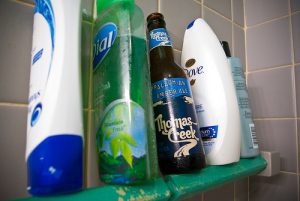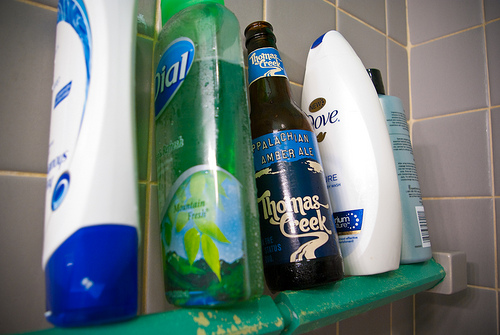by Ali Siemens (Staff Writer)
Email: alex at ufvcascade dot ca
 I’ve been bleaching my hair for over a year – it’s white blonde. Like most people with bleached hair, my mane’s texture can often be compared to hay or straw. It’s dry, damaged, and often sizzles when I straighten certain areas of my golden locks. I was challenged to use an alternative to shampoo for one week. Last week was my Sabbath day, and this week kept me away from the professional hair products I love so much.
I’ve been bleaching my hair for over a year – it’s white blonde. Like most people with bleached hair, my mane’s texture can often be compared to hay or straw. It’s dry, damaged, and often sizzles when I straighten certain areas of my golden locks. I was challenged to use an alternative to shampoo for one week. Last week was my Sabbath day, and this week kept me away from the professional hair products I love so much.
Shampoo itself has mixed reviews. A good professional shampoo can give your hair the moisture, volume, or anti-dandruff dose you need. Alas, not all of the chemicals in shampoo that give us the voluminous final product are good for us. Not to worry – there are alternatives to these apparent carcinogens we are bathing our hair in.
The first shampoo alternative I tried was apple cider vinegar. During my research, I found that using this acidic formula – which is rich in minerals and enzymes – is supposed to make one’s hair silky and lustrous. The internet told me to mix two cups of water with two tablespoons of this very potent-smelling vinegar, put it into a spray bottle and douse my mane with it. I did so, and washed it out thoroughly. I was worried about smelling like a pickle all day, but to my surprise, my hair didn’t smell like anything. I also found out that you are only supposed to wash your hair in this concoction twice a month, or else it will strip your hair of its natural oils, making it extremely dry (not what this blonde needs).
Day two required me to use baking soda. I have heard of this trick before, so I looked up the measurements (one tablespoon of baking soda and one cup of warm water in a spray bottle) and tested it out. I was less impressed with this method; I felt it left my hair with a powdery film and was essentially unmanageable.
On the third day, I was upset to waste the product, but felt it was necessary to try – beer. The sugar and proteins in beer reportedly help make hair feel thicker and give it volume. Luckily, the roommate I last kicked out left a pack of Cold Shots, so after shotgunning one, I poured another over my scalp. My complaint: the cold beer running down my back wasn’t exactly pleasant, not to mention getting the beverage in my eyes. However, the results were great. My hair was shiny and healthy-looking, and the beer didn’t leave it greasy or funny-smelling.
I also tried lemon juice, which I felt didn’t make a difference; rather, it dried my hair out. Tea tree oil was my next plan, which made my hair very greasy, and I smelled like gasoline for a day. Small amounts of tee tree oil are often added to shampoo, but when used straight, I couldn’t even stand the smell of myself.
Lastly, I tried a deep conditioning mayonnaise treatment. Note: if you use hot water to rinse out the mayonnaise, it essentially melts over your scalp, not washing it out at all and basically making your hair wet with grease for the rest of the day. So instead, you are forced to have a cold shower, which doesn’t really get the fatty condiment out of your hair either. If I could have fixed it with shampoo, I would have, but rules is rules.
At the end of my week, I was glad to have my shampoo back, but the alternative methods are definitely cheap and viable options. If I had to make a suggestion, I would go with the twice-per-month apple cider vinegar wash combined with the beer option. But washing your hair with beer isn’t cheaper, and, to be honest, I’d rather drink it.


